Quick Facts
Biography
Alexander Vasilyevich Suvorov (Russian: Алекса́ндр Васи́льевич Суво́ров, r Aleksandr Vasil‘evich Suvorov; 24 November [O.S. 13 November] 1729 or 1730 – 18 May [O.S. 6 May] 1800) was a Russian military leader and considered a national hero. He was the Count of Rymnik, Count of the Holy Roman Empire, Prince of Italy, and the last Generalissimo of the Russian Empire.
Suvorov was born in Moscow in 1729. He studied military history as a young boy and joined the Imperial Russian Army at the age of 17. During the Seven Years' War he was promoted to colonel in 1762 for his success on the battlefield. When war broke out with the Bar Confederation in 1768, Suvorov captured Krakow and defeated the Poles at Lanckorona and Stołowicze, bringing about the start of the Partitions of Poland. He was promoted to general and next fought in the Russo-Turkish War of 1768–1774, winning a decisive victory at the Battle of Kozludzha. Becoming the General of the Infantry in 1786, he commanded in the Russo–Turkish War of 1787–1792 and won crushing victories at the Battle of Rymnik and Siege of Izmail. For his accomplishments, he was made a Count of both the Russian Empire and Holy Roman Empire. Suvorov put down a Polish uprising in 1794, defeating them at the Battle of Maciejowice and storming Warsaw.
While a close associate of Empress Catherine the Great, Suvorov often quarreled with her son and heir apparent Paul. After Catherine died of a stroke in 1796, Paul I was crowned Emperor and dismissed Suvorov for disregarding his orders. However, he was forced to reinstate Suvorov and make him a field marshal at the insistence of the coalition allies for the French Revolutionary Wars. Suvorov was given command of the Austro-Russian army, captured Milan, and drove the French out of Italy at the Battles of Cassano d'Adda, Trebbia, and Novi. Suvorov was made a Prince of Italy for his deeds. Afterwards he became surrounded in the Swiss Alps by the French after a Russian army he was supposed to unite with was routed before he could arrive. Suvorov led the strategic withdrawal of Russian troops while fighting off the four times larger French force and returned to Russia with minimal casualties, for which he became the fourth Generalissimo of Russia. He died in 1800 of illness in Saint Petersburg.
Suvorov is considered one of the greatest Russian commanders. He was awarded numerous medals, titles, and honors by Russia, as well as by other countries. Suvorov secured Russia expanded borders, renewed military prestige, and a legacy of theories on warfare. He was famed for his military manual The Science of Victory and noted for several of his sayings. Several military academies, monuments, villages, museums, and orders are dedicated to him.
Early life and career
Suvorov was born into a noble family originating from Novgorod at the Moscow mansion of his maternal grandfather Fedosey Manukov. His father, Vasiliy Suvorov, was a general-in-chief and a senator in the Governing Senate, and was credited with translating Vauban's works into Russian. His paternal ancestors had emigrated from Sweden in 1622. His mother, Avdotya Fyodorovna née Manukova, was the daughter of Fedosey Manukov. The name Manukov might be a russified version of the Armenian name Manukian. Still Armenian heritage of Suvorov is considered an unproven legend. There is no academic research or source in Russia that can confirm or deny the origin of Suvorov's paternal or maternal ancestors. There are some claims that he told the Swedish ambassador to Russia in 1791 that his paternal family came from Sweden. Those statements are not reliable due the unknown context of discussion.
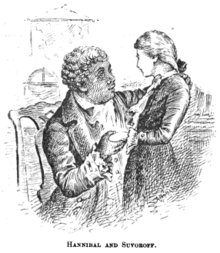
As a boy, Suvorov was a sickly child and his father assumed he would work in civil service as an adult. However, he proved to be an excellent learner, avidly studying mathematics, literature, philosophy, and geography, learning to read French, German, Polish, and Italian, and with his father's vast library devoted himself to intense study of military history, strategy, tactics, and several military authors including Plutarch, Quintus Curtius, Cornelius Nepos, Julius Caesar, and Charles XII. This also helped him develop a good understanding of engineering, siege warfare, artillery, and fortification. He tried to overcome his physical ailments through rigorous exercise and exposure to hardship. His father, however, insisted that he was not fit for the military. When Alexander was 12, General Gannibal, who lived in the neighborhood, overheard his father complaining about Alexander and asked to speak to the child. Gannibal was so impressed with the boy that he persuaded the father to allow him to pursue the career of his choice. Suvorov entered the army in 1748 and served in the Semyonovsky Life Guard Regiment for six years. During this period he continued his studies attending classes at Cadet Corps of Land Forces. He gained his first battle experience fighting against the Prussians during the Seven Years' War (1756–1763). After repeatedly distinguishing himself in battle Suvorov became a colonel in 1762, aged around 33. Suvorov next served in Poland during the Confederation of Bar, dispersed the Polish forces under Pułaski, and captured Kraków (1768), paving the way for the first partition of Poland between Austria, Prussia and Russia, and reached the rank of major-general.
The Russo-Turkish War of 1768–1774 saw his first successful campaigns against the Turks in 1773–1774, and particularly in the Battle of Kozluca, he laid the foundations of his reputation, becoming a lieutenant-general in 1774. His later earned victories against the Ottomans bolstered the morale of his soldiers who were usually outnumbered. His astuteness in war was uncanny and he also proved a self-willed subordinate who acted upon his own initiative. For "unauthorized actions against the Turks," Suvorov was tried and sentenced to death but Tsarina Catherine the Great refused to uphold the verdict, proclaiming "winners can't be judged."
In 1774, Suvorov was dispatched to suppress the rebellion of Pugachev, who claimed to be the assassinated Tsar Peter III, but arrived at the scene only in time to conduct the first interrogation of the rebel leader, who had been betrayed by his fellow Cossacks and was eventually beheaded in Moscow. The next year, he married into the influential Golitsyn family.
Battles against the Ottoman Empire

From 1774 to 1786, Suvorov served in the Kuban, the Crimea, the Caucasus, Finland, and Russia itself. He became General of the Infantry in 1786, upon completion of his tour of duty in the Caucasus. In 1778, he prevented a Turkish landing in the Crimea, thwarting another Russo-Turkish war. He commanded the Russian troops in the Crimea from 1782 to 1784 and, on behalf of Empress Catherine II, organized the resettlement of Armenian migrants displaced from Crimea and gave them permission to establish a new city, named Nor Nakhichevan by the Armenians.
From 1787 to 1791 he again fought the Turks during the Russo-Turkish War of 1787–1792 and won many victories; he was wounded twice at Kinburn (1787), took part in the siege of Ochakov, and in 1789 won two great victories at Focşani and by the river Rymnik, where a Russo-Austrian force of 25,000 routed 100,000 Turks within a few hours, losing only 500 men in the process. In both these battles an Austrian corps under Prince Josias of Saxe-Coburg participated, but at the battle of Rymnik, Suvorov was in command of the whole allied forces. For the latter victory, Catherine the Great made Suvorov a count with the name "Rymniksky" in addition to his own name, and the Emperor Joseph II made him a count of the Holy Roman Empire.
Suvorov led the Siege of Izmail in Bessarabia on 22 December 1790. His capture of the reputedly unconquerable fortress played a vital role in Russia's victory in the war. Turkish forces inside the fortress had the orders to stand their ground to the end and haughtily declined the Russian ultimatum. Their defeat was seen as a major catastrophe in the Ottoman empire. An unofficial Russian national anthem in the late 18th and early 19th centuries "Grom pobedy, razdavaysya!" (Let the thunder of victory sound!) commemorates Suvorov's victory and 24 December is today commemorated as a Day of Military Honour in Russia. Suvorov announced the capture of Ismail in 1791 to the Empress Catherine in a doggerel couplet.
Battles against Polish uprising

Immediately after the peace with the Ottoman Empire was signed, Suvorov was again transferred to Poland, where he assumed the command of one of the corps and took part in the Battle of Maciejowice, in which he captured the Polish commander-in-chief Tadeusz Kościuszko. On November 4, 1794, Suvorov's forces stormed Warsaw and captured Praga, one of its boroughs.
The massacre of approximately 20,000 civilians in Praga broke the spirits of the defenders and soon put an end to the Kościuszko Uprising. According to some sources the massacre was the deed of Cossacks who were semi-independent and were not directly subordinate to Suvorov. The Russian general was supposedly trying to stop the massacre and even went to the extent of ordering the destruction of the bridge to Warsaw over the Vistula River with the purpose of preventing the spread of violence to Warsaw from its suburb. Other historians dispute this, but most sources make no reference to Suvorov either deliberately encouraging or attempting to prevent the massacre.
Suvorov sent a report to his sovereign consisting of only three words: "Hurrah, Warsaw's ours!" (Ура, Варшава наша!). Catherine replied in two words: "Hurrah, Field-Marshal!" (rus. Ура, фельдмаршал!—that is, awarding him this title). The newly appointed field marshal remained in Poland until 1795, when he returned to Saint Petersburg. But his sovereign and friend Catherine died in 1796, and her son and successor Paul I dismissed the veteran in disgrace.
Suvorov's Italian campaign
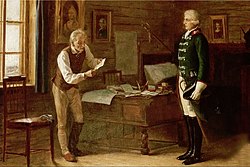
Suvorov remained a close confidant of Catherine, however he had a negative relationship with her son and heir apparent Paul. As a prince, Paul became fanatically interested in the flashy but dysfunctional uniforms, parades, drills, and common corporal punishments of the Prussian Army. He even had his own regiment of Russian soldiers whom he dressed up in Prussian style uniforms and paraded around. Suvorov was strongly opposed to these uniforms and had fought hard for Catherine to get rid of similar uniforms that were used by Russians up until 1784.
When Catherine died of a stroke in 1796, Paul I was crowned Emperor and brought back in these outdated uniforms. Suvorov was not happy with this and disregarded Paul's orders to train new soldiers in this Prussian manner, which he considered cruel and useless. Paul was infuriated and dismissed Suvorov, exiling him to his estate Konchanskoye near Borovichi and kept under surveillance. His correspondence with his wife, who had remained at Moscow for his marriage relations had not been happy, was also tampered with. It is recorded that on Sundays he tolled the bell for church and sang among the rustics in the village choir. On week days he worked among them in a smock-frock.

by Adolf Charlemagne.
In February 1799, Paul I, worried about the victories of Napoleon in Europe during the French Revolutionary Wars and at the insistence of the coalition leaders, was forced to reinstate Suvorov as field marshal. Suvorov was given command of the Austro-Russian army and sent to drive Napoleon’s forces out of Italy. Suvorov and Napoleon never met in battle because Napoleon was campaigning in Egypt at the time. However, Suvorov erased practically all of Bonaparte’s gains of 1796 and 1797, defeating his top generals Moreau at Cassano d'Adda, MacDonald at Trebbia, and Joubert at Novi. He went on to capture Milan and became a hero to those opposed to the French Revolution. French troops were driven from Italy, save for a handful in the Maritime Alps and around Genoa. Suvorov himself gained the rank of "Prince of the House of Savoy" from the King of Sardinia.
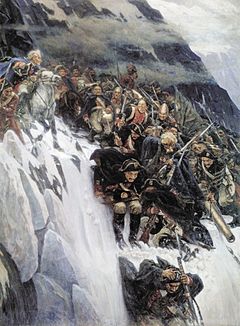
After the victorious Italian theater, Suvorov planned to march on Paris, but instead was ordered to Switzerland to join up with the Russian forces already there and drive the French out. The Russian army under General Korsakov was defeated by Masséna at Zürich before Suvorov could reach and unite with them. Surrounded by Masséna’s 80,000 French troops, Suvorov with a force of 18,000 Russian regulars and 5,000 Cossacks, exhausted and short of provisions, led a strategic withdrawal from the Alps while fighting off the French. His host hoped to make its way over the Swiss passes to the Upper Rhine and arrive at Vorarlberg, where the army, much shattered and almost destitute of horses and artillery, went into winter quarters. When Suvorov battled his way through the snow-capped Alps his army was checked but never defeated. Suvorov refused to call it a retreat and commenced a trek through the deep snows of Panix Pass and into the 9,000-foot mountains of the Bündner Oberland, by then deep in snow. Thousands of Russians slipped from the cliffs or succumbed to cold and hunger, eventually escaping encirclement and reached Chur on the Rhine, with the bulk of his army intact at 16,000 men. For this marvel of strategic retreat, earning him the nickname of the Russian Hannibal, Suvorov became the fourth Generalissimo of Russia.
He was officially promised a military triumph in Russia but Emperor Paul cancelled the ceremony and recalled the Russian armies from Europe. Early in 1800 Suvorov returned to Saint Petersburg. Paul refused to give him an audience, and, worn out and ill, the old veteran died a few days afterwards on 18 May 1800, at Saint Petersburg. Suvorov was meant to receive the funeral honors of a Generalissimo, but was buried as an ordinary field marshal due to Paul's direct interference. Lord Whitworth, the British ambassador, and the poet Gavrila Derzhavin were the only persons of distinction present at the funeral. Suvorov lies buried in the Church of the Annunciation in the Alexander Nevsky Monastery, the simple inscription on his grave stating, according to his own direction, "Here lies Suvorov."
Progeny and titles
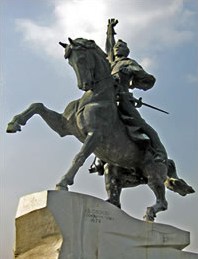
Suvorov's full name and titles (according to Russian pronunciation), ranks and awards are the following: Aleksandr Vasiliyevich Suvorov, Prince of Italy, Count of Rymnik, Count of the Holy Roman Empire, Prince of Sardinia, Generalissimo of Russia's Ground and Naval forces, Field Marshal of the Austrian and Sardinian armies; seriously wounded six times, he was the recipient of the Order of St. Andrew the First Called Apostle, Order of St. George the Bringer of Victory First Class, Order of St. Vladimir First Class, Order of St. Alexander Nevsky, Order of St. Anna First Class, Grand Cross of the Order of St. John of Jerusalem, (Austria) Order of Maria Teresa First Class, (Prussia) Order of the Black Eagle, Order of the Red Eagle, the Pour le Merite, (Sardinia) Order of the Revered Saints Maurice and Lazarus, (Bavaria) Order of St. Gubert, the Golden Lioness, (France) United Orders of the Carmelite Virgin Mary and St. Lazarus (on 20. April 1800), (Poland) Order of the White Eagle, the Order of Saint Stanislaus.
Suvorov was married to Varvara Ivanovna Prozorovskaya of the Golitsyn family and had a son and daughter, but his family life was not happy and he had an unpleasant relationship with his wife due to her infidelity. Suvorov's son, Arkadi Suvorov (1783–1811) served as a general officer in the Russian army during the Napoleonic and Turkish wars of the early 19th century, and drowned in the same river Rymnik in 1811 that had brought his father so much fame. The drowning of his son in the river is supported by Aleksey Yermolov's memoirs, as well as by the military historian Christopher Duffy. His grandson Alexander Arkadievich (1804–1882) served as Governor General of Riga in 1848–61 and Saint Petersburg in 1861–66. Suvorov's daughter Natalia Alexandrovna (1775–1844) known under her name Suvorochka married count Nikolay Zubov.
Assessment

Russians have long cherished the memory of Suvorov as a great captain of the Russian nation, and for the character of his leadership. In an age when war had become an act of diplomacy, he restored its significance as an act of force. He had a great simplicity of manner, and while on a campaign lived as a private soldier, sleeping on straw and contenting himself with the humblest fare. Suvorov was adored by his men and considered victory dependent on the morale, training, and initiative of the front-line soldier. In battle he emphasized speed and mobility, accuracy of gunfire and the use of the bayonet, as well as detailed planning and careful strategy. He abandoned traditional drills and instead communicated with his troops in ways that proved clear and understandable. Suvorov also took great care of his army's supplies and living conditions, reducing cases of illness among his soldiers dramatically.
Suvorov won 63 major battles and never lost one. He was seriously wounded six times in his military career. Suvorov was always located in the most exposed position on the battlefield, for he wanted to share the same risks and discomforts as his soldiers. He never wore warm clothing during cold winters and always slept on a simple bed of straw. Forming a paternal relationship with his soldiers, he appreciated their courage and endurance and in return Suvorov enjoyed the loyalty, respect and affection of his troops. Suvorov’s guiding principle was to detect the weakest point of an enemy and focus a devastating attack upon that area. He would send forth his units in small groups as they arrived on the battlefield in order to sustain momentum. Suvorov utilized aimed fire instead of repeated barrages from line infantry and applied light infantrymen as skirmishers and sharpshooters. He used a variety of army sizes and types of formations against different foes: squares against the Turks, lines against Poles, and columns against the French.
According to D.S. Mirsky, Suvorov "gave much attention to the form of his correspondence, and especially of his orders of the day. These latter are highly original, deliberately aiming at unexpected and striking effects. Their style is a succession of nervous staccato sentences, which produce the effect of blow and flashes. Suvorov's official reports often assume a memorable and striking form. His writings are as different from the common run of classical prose as his tactics were from those of Frederick or Marlborough."

His gibes procured him many enemies. He had all the contempt of a man of ability and action for ignorant favorites and ornamental carpet-knights. But his drolleries served sometimes to hide, more often to express, a soldierly genius, the effect of which the Russian army did not soon outgrow. If the tactics of the Russians in the Russo-Japanese War of 1904–1905 reflected too literally some of the maxims of Suvorov's Turkish wars, the spirit of self-sacrifice, resolution and indifference to losses there shown formed a precious legacy from those wars. Mikhail Ivanovich Dragomirov (1830-1905) declared that he based his teaching on Suvorov's practice, which he held as representative of the fundamental truths of war and of the military qualities of the Russian nation.
Suvorov considered Hannibal, Alexander the Great, Julius Caesar, and Napoleon Bonaparte to be the greatest military commanders of all time. His high regard for Napoleon is interesting because he did not live to see the Napoleonic Wars. Suvorov is often compared to Napoleon, whom he was on opposing sides of during the late French Revolutionary Wars and desired to face in battle, but never did so because Napoleon was campaigning in Egypt while Suvorov was campaigning in Italy. Military historians often debate between Suvorov and Napoleon as to who was the superior commander.
His political views were centered around enlightened monarchy. However, Suvorov had no interest in pursuing politics and made his disdain for the court lifestyle and tendencies of aristocrats well known.
Legacy

Suvorov was buried in Saint Petersburg in the Alexander Nevsky Lavra. His grave stone states simply: "Here lies Suvorov". Within a year after his death, Paul I was murdered in his bedroom for his disastrous leadership by a band of dismissed officers and his son and successor Alexander I erected a statue to Suvorov's memory in the Field of Mars.
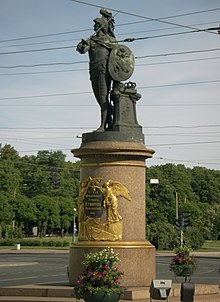
He was famed for his military writings, the most well-known being The Science of Victory and Suzdal Regulations, and lesser-known works such as Rules for the Kuban and Crimean Corps, Rules for the Conduct of Military Actions in the Mountains (written during his Swiss campaign), and Rules for the Medical Officers. Suvorov was also noted for several of his sayings, including "What is difficult in training will become easy in a battle," "The bullet is a mad thing; only the bayonet knows what it is about," and "Perish yourself but rescue your comrade!" He taught his soldiers to attack instantly and decisively: "Attack with the cold steel! Push hard with the bayonet!" He joked with the men, calling common soldiers "brother," and shrewdly presented the results of detailed planning and careful strategy as the work of inspiration.
A ‘Suvorov school’ of generals who had apprenticed under him played a prominent role in the Russian military. Among them was future Field Marshal Mikhail Kutuzov who led the Imperial Russian Army against Napoleon during the Napoleonic Wars, including the French invasion of Russia.
The Suvorov Museum opened in Saint Petersburg in 1900 to commemorate the centenary of the general's death. Apart from in St. Petersburg, other Suvorov monuments have feature in Focşani, Ochakov (1907), Sevastopol, Izmail, Tulchin, Kobrin, Novaya Ladoga, Kherson, Timanovka, Simferopol, Kaliningrad, Konchanskoye, Rymnik, Elm, Switzerland and in the Swiss Alps.

During World War II, the Soviet Union revived the memory of many pre-1917 heroes in order to raise patriotism. Suvorov was the Tsarist military figure most often referred to by Joseph Stalin, who also adopted the rank of Generalissimo that Suvorov had previously held. The Order of Suvorov was established by the Presidium of the Supreme Soviet on 29 July 1942 and is rewarded to senior army personnel for exceptional leadership in combat operations against superior enemy forces.
The town of Suvorovo in Varna Province, Bulgaria, was named after Suvorov, as was the Russian ship which discovered Suwarrow Island in the Pacific in 1814.
Various currency notes of the Transnistrian ruble depict Suvorov.
His prowess, military wisdom, and daring remain in high regard. Another of his many utterances, "Achieve victory not by numbers, but by knowing how" and "Train hard, fight easy. Train easy and you will have hard fighting" are well known in the Russian military. “Train hard, fight easy” became a Russian proverb.
A bust of the Generalissimo is prominently displayed in the office of the Russian Minister of Defense.
In Russia and Belarus, there are 8 secondary-level military schools called Suvorov Military School that were established during the USSR. A military school after Alexander Suvorov and Valerian Madatov is currently being constructed in the Armenian-populated Nagorno-Karabakh Republic under a national security program. The school is going to be the most up-to-date in the Commonwealth of Independent States (CIS) in its architecture, technical equipment and education methods. There is also a military school in Minsk named after Suvorov.
